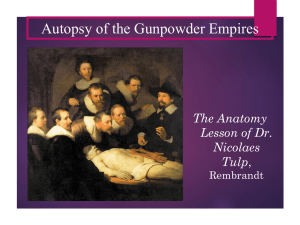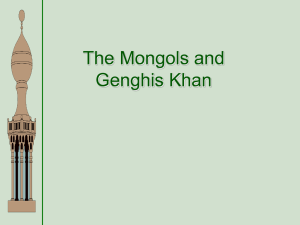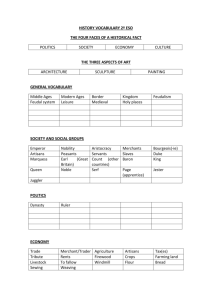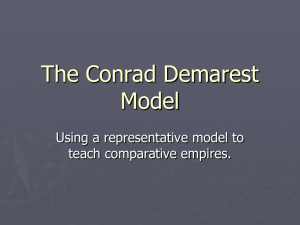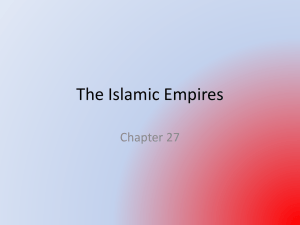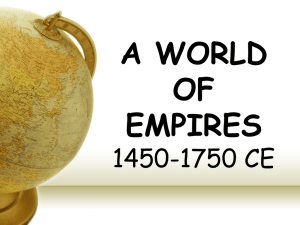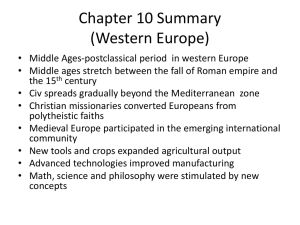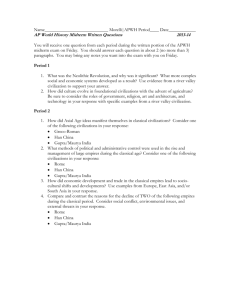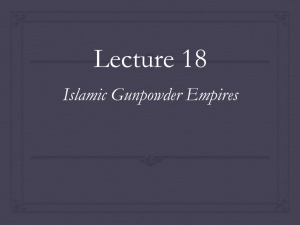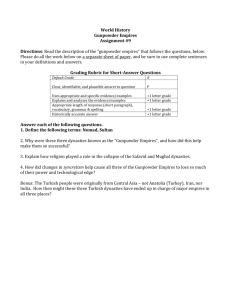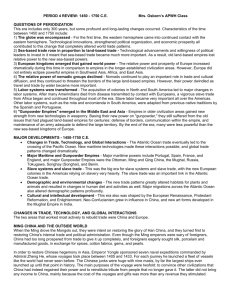Gunpowder Empire Comparison Chart
advertisement
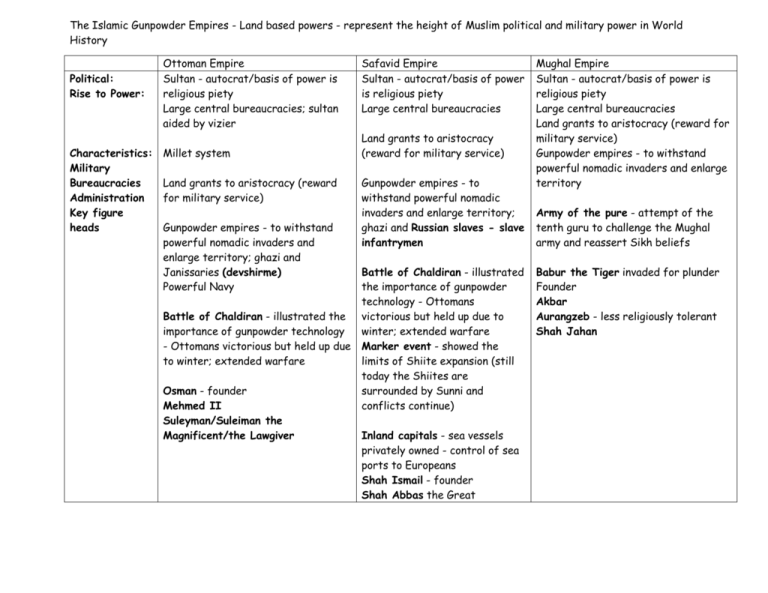
The Islamic Gunpowder Empires - Land based powers - represent the height of Muslim political and military power in World History Political: Rise to Power: Characteristics: Military Bureaucracies Administration Key figure heads Ottoman Empire Sultan - autocrat/basis of power is religious piety Large central bureaucracies; sultan aided by vizier Millet system Land grants to aristocracy (reward for military service) Gunpowder empires - to withstand powerful nomadic invaders and enlarge territory; ghazi and Janissaries (devshirme) Powerful Navy Battle of Chaldiran - illustrated the importance of gunpowder technology - Ottomans victorious but held up due to winter; extended warfare Osman - founder Mehmed II Suleyman/Suleiman the Magnificent/the Lawgiver Safavid Empire Sultan - autocrat/basis of power is religious piety Large central bureaucracies Land grants to aristocracy (reward for military service) Gunpowder empires - to withstand powerful nomadic invaders and enlarge territory; ghazi and Russian slaves - slave infantrymen Battle of Chaldiran - illustrated the importance of gunpowder technology - Ottomans victorious but held up due to winter; extended warfare Marker event - showed the limits of Shiite expansion (still today the Shiites are surrounded by Sunni and conflicts continue) Inland capitals - sea vessels privately owned - control of sea ports to Europeans Shah Ismail - founder Shah Abbas the Great Mughal Empire Sultan - autocrat/basis of power is religious piety Large central bureaucracies Land grants to aristocracy (reward for military service) Gunpowder empires - to withstand powerful nomadic invaders and enlarge territory Army of the pure - attempt of the tenth guru to challenge the Mughal army and reassert Sikh beliefs Babur the Tiger invaded for plunder Founder Akbar Aurangzeb - less religiously tolerant Shah Jahan The Islamic Gunpowder Empires - Land based powers - represent the height of Muslim political and military power in World History Economic Characteristics Trade Economy Based on agriculture but trade important - most favorably located of the three Emperor owned everything Jizra (head tax) Little impact from Americas - Coffee and tobacco Shared parts of Silk Road Large number of merchants and artisans/guilds supervised by govt Religion/culture Sunni Ottoman - from Osman Cultural differences led to frequent warfare Encouraged the arts and unique artistic styles developed Social Characteristics Steppe Turkish traditions and intrafamily conflicts for power Patriarchal - wives of elite had influence; purdah and veiled Multiplicity of faiths in each empire led to tension Based on agriculture but trade important Inland capitals - sea vessels privately owned - control of sea ports to Europeans Emperor owned everything Jizra (head tax) Little impact from Americas Coffee and tobacco Shared parts of Silk Road Persian carpets Shiite - Twelver Shiism followers: qizilbash Safavid after Safi al-Din (Sufi) Cultural differences led to frequent warfare Blend of Turkish and Persian influences Encouraged the arts and unique artistic styles developed Persian calligraphy emphasized Against technology Steppe Turkish traditions and intra-family conflicts for power Patriarchal - wives of elite had influence - purdah and veiled Based on agriculture but trade important Inland capitals - sea vessels privately owned - control of sea ports to Europeans Emperor owned everything Jizra (head tax) Little impact from Americas - Coffee and tobacco Not as interested in trade; allowed Europeans to set up trading posts Divine Faith - Akbar encouraged Muslim Hindu tolerance (primarily Sunni) Hindu -sati Mughal - Persian for Mongol Cultural differences led to frequent warfare Encouraged the arts and unique artistic styles developed Influenced by Hindu preference for intricate designs Steppe Turkish traditions and intrafamily conflicts for power Patriarchal - wives of elite had influence; purdah and veiled Multiplicity of faiths in each empire led to tension The Islamic Gunpowder Empires - Land based powers - represent the height of Muslim political and military power in World History Multiplicity of faiths in each empire led to tension Princes fought to become heir; political instability caused by family controversies always threatened the empire Looked inward, felt superior, and Looked inward, felt superior, and tried to keep out new ideas, which led tried to keep out new ideas, to their eventual decline and which led to their eventual extinction decline and extinction Political decline by 1750's - expansion Political decline by 1750's dried up expansion dried up Ottoman princes become lazy Safavid Shiites persecute through luxury Sunnis, non-Muslims, and even Wahhabi movement Sufis Foreign trade controlled by Foreign trade controlled by Europeans Europeans Military, administrative network Military, administrative network expensive to maintain expensive to maintain Sons kept in palace to prevent coups/led to sheltered less competent rulers and instability threatened the empire Decline: Islamic empires less interested in outside world - thus didn't understand the tremendous changes Europe was bringing to the world – Thought they had it all Swiftly fell behind in technological development Corruption among local govt officials (taxing/pocketing) Islamic empires less interested in outside world - thus didn't understand the tremendous changes Europe was bringing to the world – Thought they had it all – Swiftly fell behind in technological development Princes fought to become heir; political instability caused by family controversies always threatened the empire Looked inward, felt superior, and tried to keep out new ideas, which led to their eventual decline and extinction Political decline by 1750's - expansion dried up Foreign trade controlled by Europeans Military, administrative network expensive to maintain Islamic empires less interested in outside world- thus didn't understand the tremendous changes Europe was bringing to the world – Thought they had it all Swiftly fell behind in technological development Disadvantage in world economy because of inflation caused by New World silver - Europeans controlled The Islamic Gunpowder Empires - Land based powers - represent the height of Muslim political and military power in World History Disadvantage in world economy because of inflation caused by New World silver - Europeans controlled (sultans taxes were fixed rate value of the taxes decreased) Empire had less money to pay, etc. Marched on Europe, stopped just outside of Vienna Lost famous sea battle of Lepanto to Spanish - end of Ottoman Lake Gradually loses power and dominance Disadvantage in world economy because of inflation caused by New World silver - Europeans controlled - difficult to pay army and bureaucracy Collapsed in 1720's (Turkish and Afghani attack - a victim of Islamic infighting and growing dominance of sea-based powers) Unstable empire after Akbar's death - Europeans ready to take advantage of disunity
